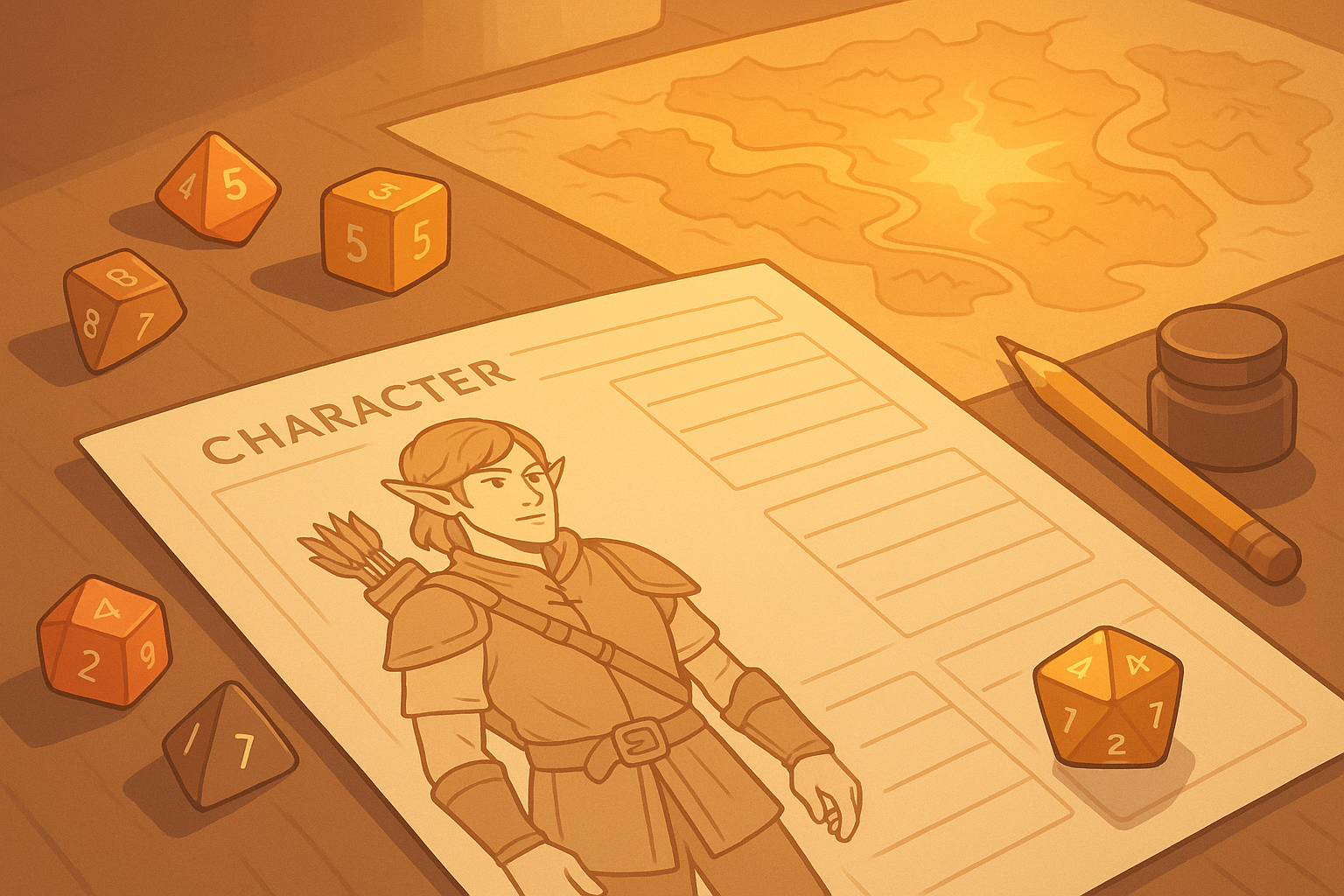Barter systems in TTRPGs add depth to gameplay by replacing traditional currency with direct exchanges of goods and services. This mechanic thrives in settings like post-apocalyptic worlds or primitive societies, where formal economies have collapsed. The result? Every trade becomes a negotiation, blending strategy, creativity, and roleplay.
Here are the top 7 TTRPGs with standout barter mechanics:
- Prismatic Wasteland: Features Treasure Dice and Reputation Rolls for dynamic trades.
- Fallout 2d20: Uses bottle caps and scarcity-based pricing.
- Root RPG: Faction-driven economy with seasonal shifts.
- Adventurer Conqueror King System (ACKS): Settlement-based trade and domain management.
- Numenera: Focuses on trading ancient artifacts instead of currency.
- Traveller RPG: Interstellar trade with supply-demand mechanics.
- Warhammer 40k: Rogue Trader: Profit Factor system for large-scale trading ventures.
Quick Comparison
| Game | Key Feature | Complexity | Setting |
|---|---|---|---|
| Prismatic Wasteland | Treasure Dice, Reputation Rolls | Medium | Post-apocalyptic |
| Fallout 2d20 | Bottle caps, scarcity pricing | Low | Post-apocalyptic |
| Root RPG | Faction economy, seasons | Medium | Woodland fantasy |
| ACKS | Settlement trade, domain focus | High | Medieval fantasy |
| Numenera | Artifact-based economy | Low | Sci-fi/fantasy hybrid |
| Traveller RPG | Interstellar trade networks | High | Sci-fi |
| Rogue Trader | Profit Factor, large-scale trade | High | Sci-fi (Warhammer 40k) |
These games make trading more than just item exchanges - they turn it into a core part of the story and strategy. Whether you want fast-paced trades or detailed economic systems, there’s a TTRPG on this list for you.
Fallout 2d20: Buying, Selling, Haggling & Bartering. Learn to Play Series TTRPG Modiphius
1. Prismatic Wasteland
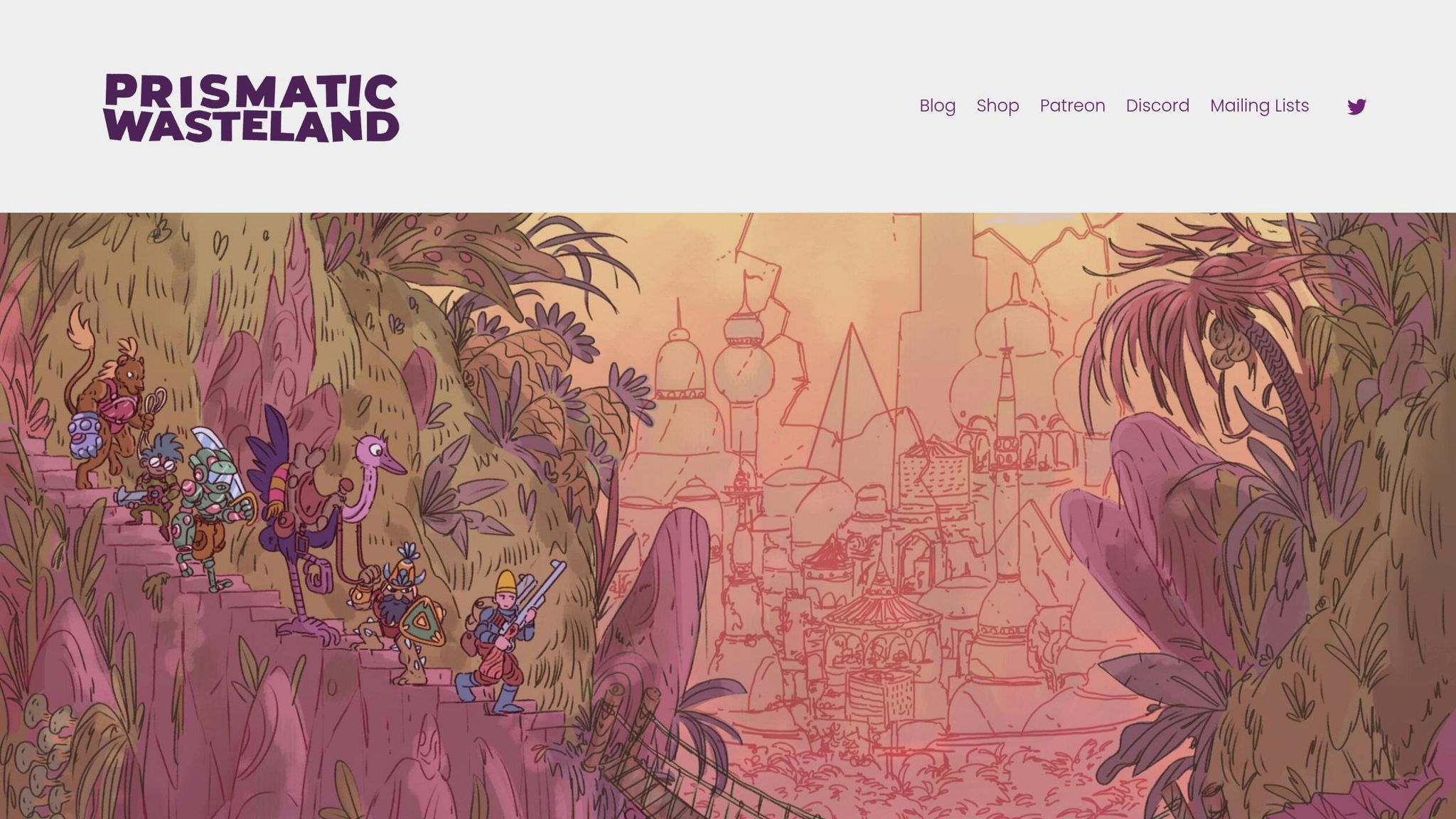
Prismatic Wasteland introduces a clever 'Treasure' system that brings post-apocalyptic trading to life while keeping the gameplay dynamic and engaging.
At its core, the system relies on two main mechanics: Treasure Dice and Reputation Rolls. Here’s how it works: when players want to buy goods or services, they first calculate the total value of what they’re after. Then, they make a Reputation Roll, which can either lower the cost (if the roll is favorable) or increase it (if luck isn’t on their side).
The process for trading is straightforward and follows these steps:
| Step | What Happens |
|---|---|
| Calculate Value | Determine the total cost of the desired items. |
| Make Reputation Roll | Adjust the price - either up or down - based on the roll. |
| Offer Treasure | Roll Treasure Dice to match or exceed the modified price. |
| Resolve Transaction | Complete the trade if the value is met or exceeded. |
Merchants in this world refuse to accept used or worn-out gear, which forces players to discard old equipment instead of trading it. This adds an extra layer of resource management to the game.
If players fall short during a trade, they have a unique option: sacrificing 1d6 Charisma points to gain a +1 bonus on their roll. This mechanic ties a character’s personal charm directly to their success in negotiations, making social interactions feel more meaningful and high-stakes.
What makes this system even more interesting is how it connects to other survival mechanics. For example, the barter system interacts with challenges like carousing and starvation, creating a constant need to juggle resources, reputation, and survival. Every trade becomes a strategic decision, blending storytelling with tactical gameplay.
2. Fallout 2d20
Fallout 2d20 brings the post-apocalyptic world of Fallout to life on the tabletop, complete with its bottle cap-based economy and dynamic trading system. Developed by Modiphius Entertainment, this official adaptation captures the spirit of the video game while adding layers of depth suited for tabletop roleplaying.
How Trading Works in Fallout 2d20
The economy revolves around bottle caps, scarcity, and your character's skills. Caps hold value purely because the wasteland’s survivors agree they do, creating a fascinating system where worth is fluid and context-dependent. This sets the stage for a trading environment that feels alive and player-driven.
Here are some key factors influencing bartering:
| Trading Factor | Impact on Bartering |
|---|---|
| Base Item Value | Establishes the starting price in caps. |
| Local Scarcity | Multiplies prices based on how rare an item is in the region. |
| Item Condition | Better-maintained items command higher prices. |
| Character Skills | Barter skill and Charisma can significantly alter prices. |
| Faction Standing | Determines merchant access and affects pricing. |
The Settlement Resource mechanic adds another layer of realism. Each community's resources directly impact what’s available and at what price. For instance, settlements near water purification plants might sell clean water cheaply, while desert outposts charge a premium. This system ensures every trade feels connected to the broader world.
For rare items like power armor or advanced energy weapons, the Rarity Check system comes into play. Players must first locate a merchant specializing in such goods, and even then, the prices can be sky-high compared to more common items.
Enhancing Trade Through Character Perks
Character progression can make a big difference in trading. Specialized perks allow players to tailor their approach to commerce:
- Cap Collector: Increases your buying power.
- Merchant of Death: Provides better deals on weapons.
- Wasteland Whisperer: Improves relationships with factions, opening new trade opportunities.
- Fortune Finder: Boosts your chances of finding caps during exploration.
These perks encourage players to develop unique strategies, whether they aim to dominate the market or simply survive.
Realistic Post-Apocalyptic Economy
Unlike the video games, where trading often boils down to simple percentage adjustments, Fallout 2d20 emphasizes negotiation and roleplaying. Every transaction offers flexibility and an opportunity for creative problem-solving.
The system also discourages hoarding through weight limits and item degradation. Players must think carefully about what to carry and trade, making every decision feel meaningful. This approach creates a gritty, realistic economy that captures the harsh realities of surviving in a post-nuclear wasteland.
3. Root: The Roleplaying Game
Root brings a woodland-themed twist to the concept of barter systems, blending faction dynamics with seasonal changes. This game weaves negotiation and resource management into its mechanics, creating a unique bartering experience set in a vibrant forest.
Faction-Based Economy
In Root, the economy revolves around the interplay of factions, each with its own resources and trading preferences. Here's a quick look at how these factions operate:
| Faction | Primary Resources | Trading Approach |
|---|---|---|
| Marquise de Cat | Crafted goods, lumber | Structured and bureaucratic |
| Woodland Alliance | Food supplies, information | Cooperative and collective |
| Eyrie Dynasties | Weapons | Hierarchical and formal |
| Vagabonds | Safe passage | Built on personal connections |
Each faction's unique priorities add depth to the trading dynamics, encouraging players to adapt their strategies based on who they’re dealing with.
Seasonal Trading Mechanics
The seasons in Root play a big role in shaping resource availability and trade. Here's how they impact the game:
| Season | Resource Availability | Trading Effects |
|---|---|---|
| Spring | Plenty of food, limited lumber | Essential building materials gain value |
| Summer | High production | Balanced trading opportunities |
| Autumn | Bountiful harvests | Surplus goods flood the market |
| Winter | Scarcity of resources | Prices soar as demand spikes |
These seasonal shifts keep players on their toes, forcing them to plan ahead and adjust their tactics as conditions change.
Character Trading Specialization
Root's "Woodland Ways" skill system allows players to refine their trading abilities, making every negotiation more strategic:
- Forest Lore: Helps locate valuable resources in the wild.
- Faction Customs: Enhances understanding of different trading traditions.
- Silver Tongue: Boosts persuasion and negotiation skills.
These skills make trading more than just a mechanical exchange, turning it into a dynamic part of the gameplay.
Resource Management
The value of resources in Root isn't static - it depends on faction needs, seasonal availability, and political tensions. Players can adapt their strategies by, for example, stockpiling food before the harsh winter or prioritizing weapons during periods of unrest. This fluid system keeps the economy lively and unpredictable.
Trade Disputes and Conflicts
Disagreements over trades aren't just setbacks - they’re opportunities for storytelling. The Trade Disputes system ensures that failed negotiations or resource shortages can lead to conflicts between factions, providing rich material for adventures and challenges.
Reputation System
Strong relationships with factions are key to trading success. The game's Reputation Rolls directly influence exchange rates, rewarding players with better deals for solid connections - or penalizing them for strained ties. Building and maintaining trust becomes as important as the trade itself.
4. Adventurer Conqueror King System (ACKS)
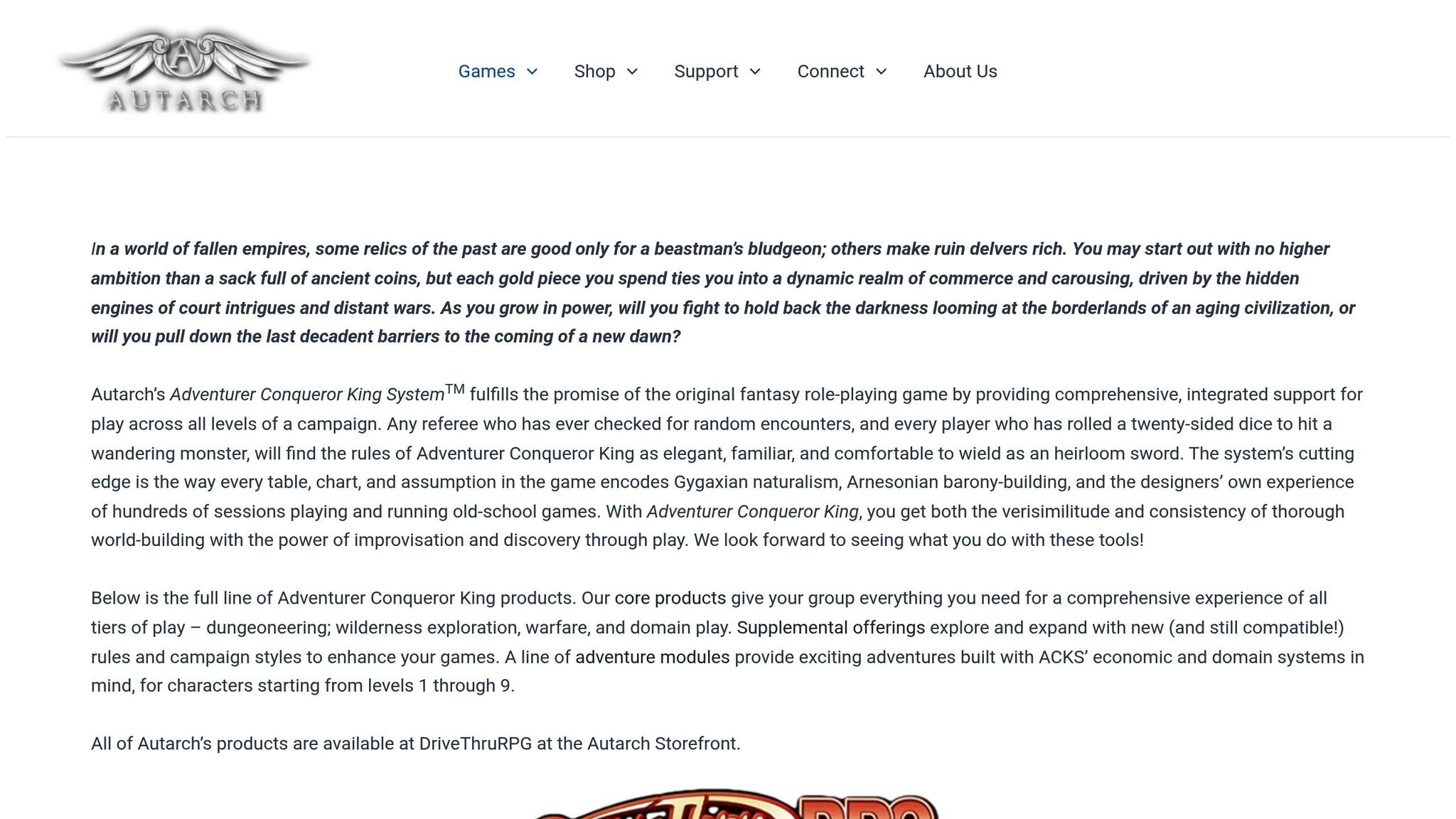
The Adventurer Conqueror King System (ACKS) introduces a dynamic trade economy where market forces and player decisions actively shape the availability and pricing of goods.
Market and Trade Mechanics
One of the standout features of ACKS is its flexible market system. Instead of sticking to static prices, the game adjusts costs based on factors like the size of a settlement and its economic health. For example, bustling cities often offer a wide range of goods at lower prices due to competition, while smaller towns might face shortages, causing prices to spike. This ever-changing market creates opportunities for players to leave their mark on the economy.
Dynamic Economy in Action
Player choices play a direct role in shaping the economic landscape. Clearing trade routes, forming alliances with merchants, or even disrupting rival trade networks can shift supply and demand. This means players must stay on their toes, constantly adjusting their strategies to thrive in a world where economic conditions are always evolving.
Trade and Negotiation
ACKS also places a strong emphasis on negotiation and reputation. Players who excel at bargaining or have built strong relationships can secure better deals. The barter system highlights the importance of resource management and clever negotiation, rewarding players who think strategically.
Domain Management and Economic Modeling
When players take control of a domain - whether it’s a business or a territory - they face a variety of economic challenges. Factors like crop yields, taxation policies, labor expenses, and trade revenue all come into play. Each decision can ripple through the local economy, influencing trade opportunities and requiring careful planning. This layer of domain management adds a strategic depth that goes beyond simple adventuring.
Resource Management
To succeed in ACKS, players must master supply chain planning and adapt to market shifts. This focus on resource management adds a satisfying layer of complexity, making both trading and adventuring more engaging and rewarding.
sbb-itb-b8b00a5
5. Numenera
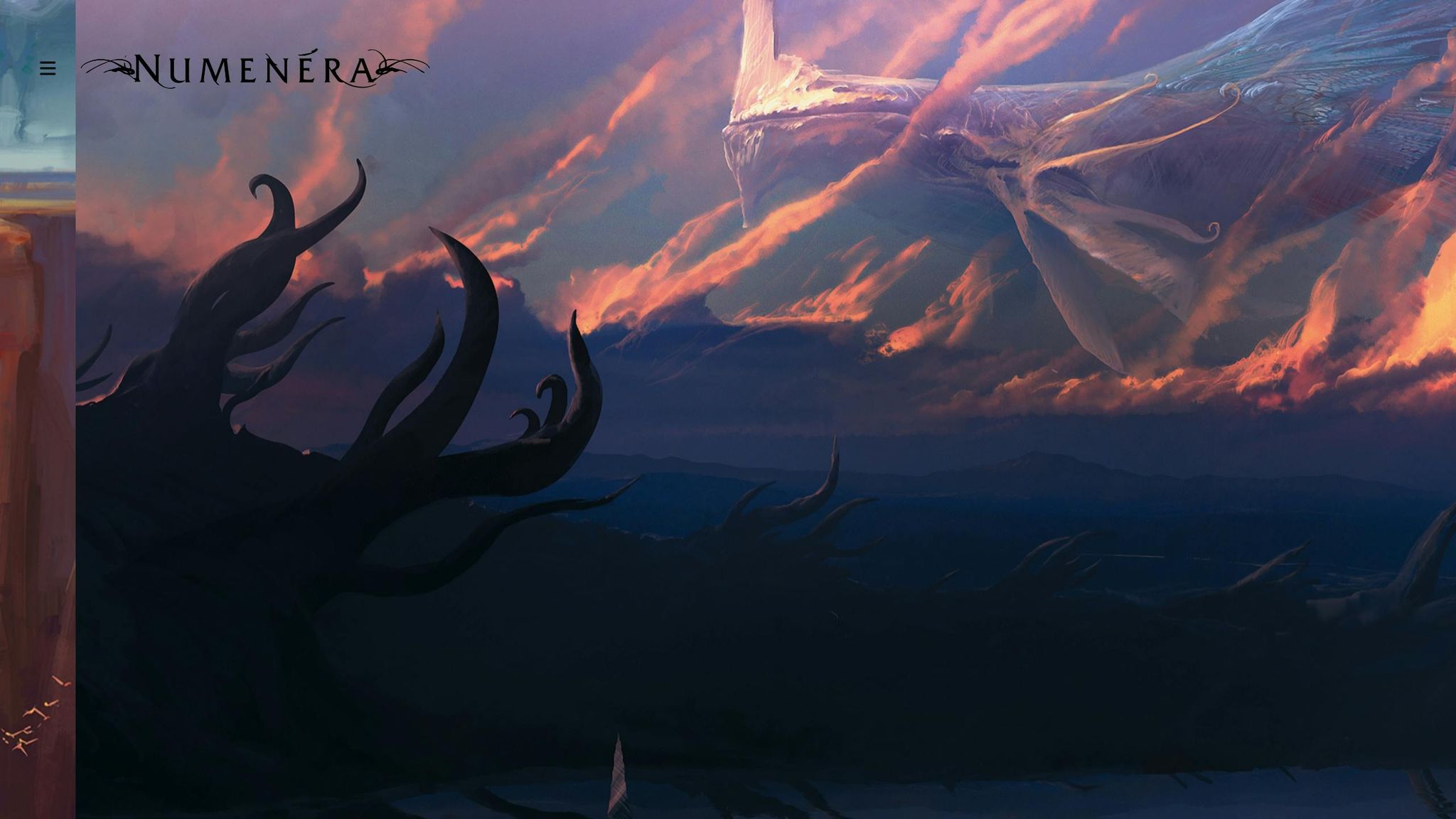
Numenera shifts the concept of trade into a world where ancient technology holds more value than traditional currency.
Currency and Trade Basics
In this game, the currency is called shins - small fragments made of metal, crystal, or glass. However, trade revolves less around fixed prices and more around the utility and understanding of artifacts, making value a flexible concept.
Artifact Classification System
Artifacts in Numenera are categorized based on their utility and rarity, shaping trade and economic interactions:
| Artifact Type | Trade Value | Characteristics |
|---|---|---|
| Oddities | Low | Small curiosities with little practical use |
| Cyphers | Medium | One-time-use items that need to be traded quickly |
| Artifacts | High | Rare devices with significant power |
| Iotum | Variable | Standardized crafting materials |
This system not only guides individual transactions but also influences how entire local economies function.
Community-Based Trading
Each settlement in Numenera has its own unique trading customs, heavily influenced by local resources and needs. For instance, a community with abundant water might trade it cheaply but place a high value on metals. Conversely, a settlement near ancient ruins could have plenty of artifacts but lack essentials like food or clean water. These variations create opportunities for players who can adapt to the specific economy of each locale.
The Role of Knowledge
Knowledge is a powerful currency in its own right. Aeon Priests, experts in ancient technology, play a critical role in the economy. They authenticate items, establish fair values, and maintain trade networks across the Ninth World. Players skilled in "Understanding Numenera" can use this knowledge to gain an edge in negotiations and trading.
Risk and Reward System
Trading in Numenera isn't without its challenges. Items like cyphers become unstable if hoarded, pushing players to either use or trade them quickly. Artifacts also come with a depletion mechanic, meaning they may stop functioning after use, which directly impacts their trade value. These mechanics add layers of strategy to the trading system.
Crafting and Salvage
The Destiny expansion takes trading to another level by introducing salvaging and crafting. Players can break down artifacts into components, opening up new possibilities for both crafting and trade. This encourages creativity and resourcefulness in managing materials and items.
Numenera's trading system is more than just a gameplay feature - it ties deeply into the game's themes. It reflects the mystery and allure of ancient technologies, emphasizing how understanding and adapting to these remnants of the past shapes the world and its economies.
6. Traveller RPG
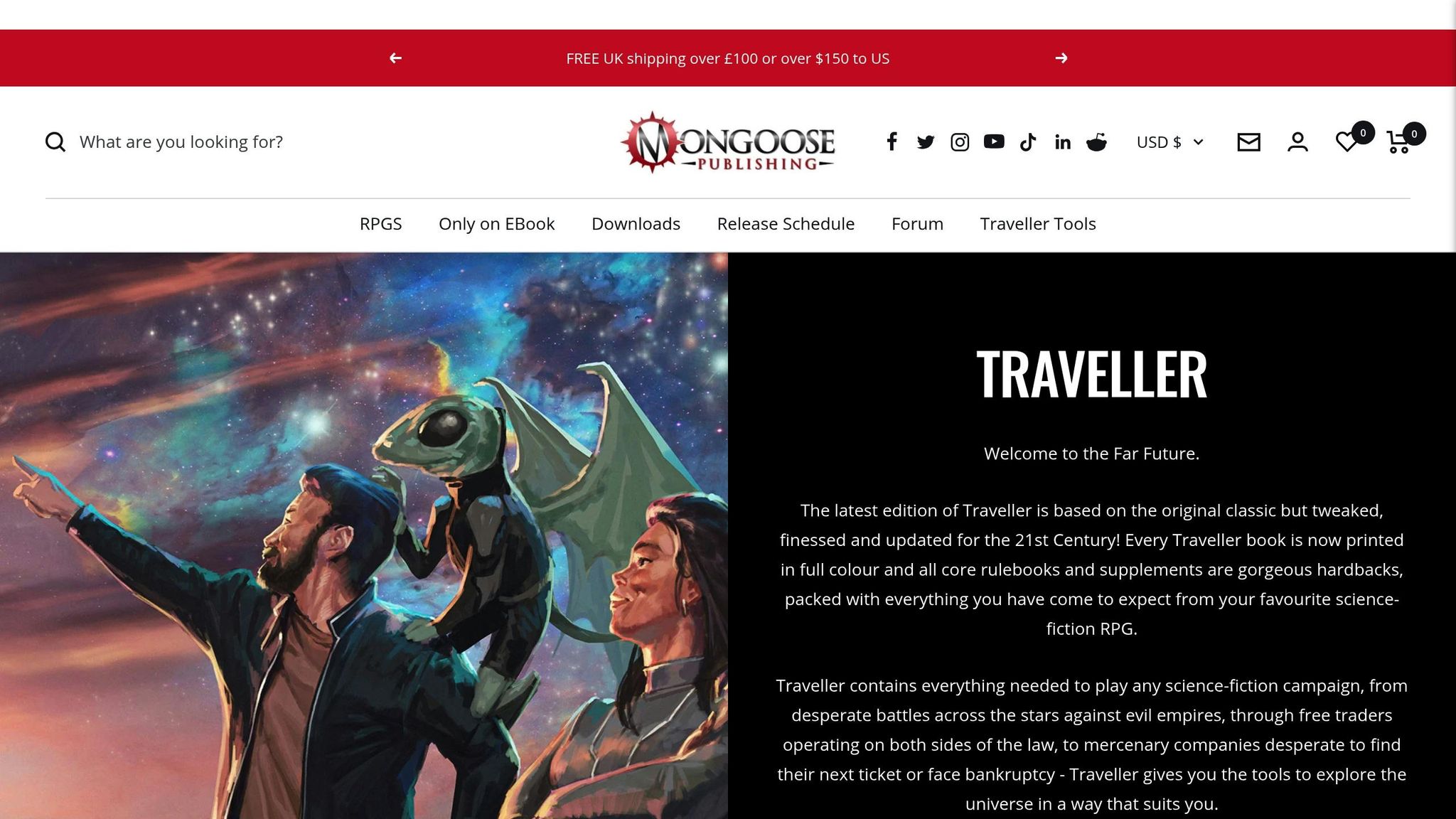
Traveller RPG turns the life of a starship crew into a high-stakes trading adventure, where players navigate fluctuating markets, juggle resources, and tackle risks head-on.
Trade System Fundamentals
At the heart of Traveller's trading mechanics is a dynamic supply and demand system. Each planet's market conditions are shaped by key factors:
| Factor | Influence on Trade |
|---|---|
| Tech Level | Determines available goods and manufacturing capabilities |
| Government Type | Impacts trade restrictions and tariffs |
| Population | Drives demand and consumption patterns |
| Local Resources | Sets baseline prices for raw materials |
These variables create unique opportunities and challenges, making every trade route a puzzle to solve.
Cargo Management
Managing cargo is a balancing act. Players must weigh several factors:
- Upfront costs like cargo purchase and fuel
- Ongoing expenses, including crew salaries, maintenance, and docking fees
- Profit margins that depend on shifting market conditions
The choices players make about what to haul - and where to haul it - can make or break their trading ventures.
Risk and Opportunity
Trading in Traveller isn’t without its dangers. Players face risks that require careful planning to overcome:
| Risk Type | Consequence | How to Mitigate |
|---|---|---|
| Market Fluctuations | Prices may drop unexpectedly | Diversify your cargo |
| Piracy | Loss of cargo or worse | Invest in protection or escorts |
| Customs Inspections | Delays and potential fines | Ensure proper documentation |
| Equipment Failures | Emergency repairs can be costly | Perform regular maintenance |
These risks add layers of strategy, as players must plan for the unexpected while chasing lucrative opportunities.
Advanced Trading Features
Traveller offers several trading options for players looking to test their skills:
- Speculative Trading: Buying goods without a guaranteed buyer, hoping for a profit later
- Black Market Deals: High-risk, high-reward trades that come with added danger
- Contract Hauling: Secure but lower-margin jobs for steady income
- Resource Arbitrage: Profiting from price differences between systems
These features provide depth and variety, ensuring no two trading experiences are the same.
Economic Strategy
Success in Traveller comes down to strategic planning. Players must balance short-term profits with long-term sustainability by managing fuel reserves, scheduling maintenance, and keeping the crew happy. Negotiation also plays a key role - market conditions, reputation, and bargaining skills can all tip the scales in a deal. This focus on planning and adaptability creates opportunities for both tactical gameplay and immersive roleplay.
Traveller's trade mechanics highlight the importance of resource management and strategic thinking in a universe full of ever-changing challenges and rewards.
7. Warhammer 40k: Rogue Trader
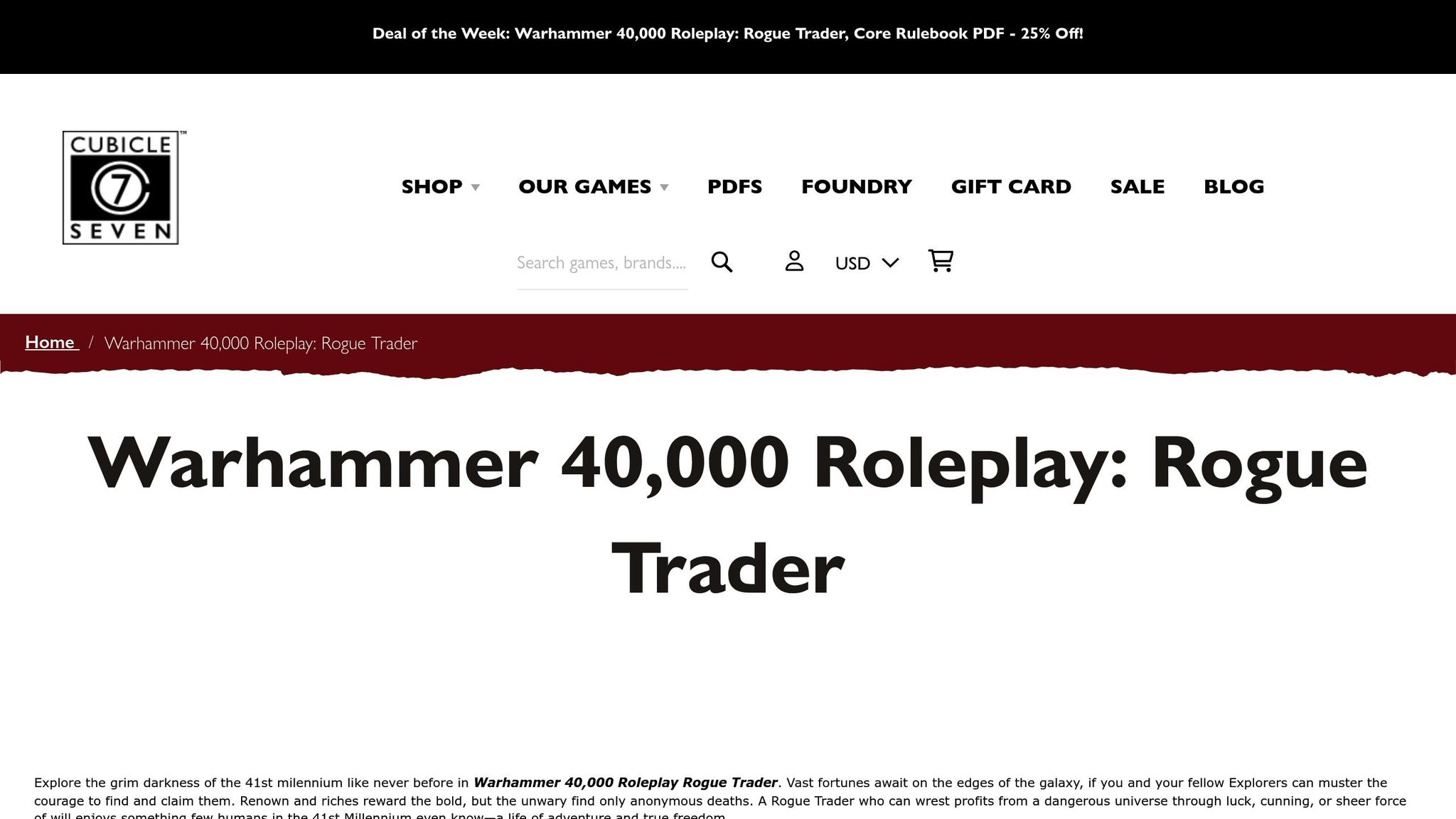
In Warhammer 40k: Rogue Trader, trade isn't just a way to make a living - it's a matter of survival, power, and influence. The game's Profit Factor system serves as a clever way to represent wealth and trading clout, capturing the immense scale of interstellar commerce in the grim darkness of the 41st millennium. This system weaves together elements of negotiation, risk-taking, and resource management, making trade an integral part of gameplay.
The Warrant of Trade System
At the heart of the trading system lies the Warrant of Trade, a hereditary document that grants the right to trade across the galaxy. This system revolves around three key components:
| Trading Component | Description | Impact on Gameplay |
|---|---|---|
| Profit Factor | Represents abstract wealth (ranges from 20–100+) | Governs purchasing power and influence |
| Achievement Points | Resource used for major acquisitions | Enables significant investments and purchases |
| Contact Ratings | Measures relationships with factions | Affects trade success and access to rare goods |
Risk and Reward in Commerce
Every trading venture comes with its own level of risk and reward. Here's how the system breaks it down:
| Commerce Type | Risk Level | Potential Profit | Requirements |
|---|---|---|---|
| Imperial Trade | Low | 1d5 Profit | Strong Imperial reputation |
| Xenos Commerce | Medium | 2d5 Profit | Diplomatic skills and key contacts |
| Cold Trade | High | 3d10 Profit | Criminal connections and secrecy |
Key Trading Features
The game enriches its trading mechanics with a variety of unique features, such as:
- Archeotech Trading: Dealing in ancient and powerful technology.
- Soul Stone Commerce: A high-stakes market tied to forbidden goods.
- Resource Exploitation: Managing and extracting planetary resources.
- Dynasty Management: Expanding your Rogue Trader's family empire.
The Cold Trade
For those willing to take on extreme risks, the Cold Trade offers the chance to deal in contraband and forbidden items. While the profits can be immense, the dangers are equally high - Imperial authorities are always watching, and being caught could lead to accusations of heresy.
Market Dynamics
The trading system isn't static. Market values shift based on a range of in-game factors, including:
- Local planetary conditions
- The dangers of Warp travel
- Shifting political alliances
- Resource scarcity or abundance
- Technological advancements
Instead of focusing solely on traditional currency, the game emphasizes relationships, influence, and strategy. This approach mirrors the feudal economy of the Imperium, where power and connections often outweigh pure financial wealth. It all comes together to create a commerce system that feels alive and deeply tied to the game's universe.
Game Systems Comparison
Each of these seven TTRPGs brings its own twist to barter mechanics, balancing depth and accessibility while staying true to their unique worlds. Below, we break down how trade systems are integrated into gameplay, comparing core mechanics, reputation systems, and market dynamics.
Core Mechanics and Resolution
Here's a quick look at how each game handles exchanges, from basic trades to intricate economic systems:
| Game | Main Exchange Method | Resolution Mechanic | Complexity Level |
|---|---|---|---|
| Prismatic Wasteland | Treasure Dice System | Reputation + Dice Rolls | Medium |
| Fallout 2d20 | Post-apocalyptic Items | Item-based Exchange | Low |
| Root: RPG | Faction Resources | Relationship-driven | Medium |
| ACKS | Settlement-based Trade | Settlement management | High |
| Numenera | Oddities & Artifacts | Abstract Value | Low |
| Traveller RPG | Trade Networks | Complex Markets | High |
| Rogue Trader | Profit Factor | Profit Factor | High |
Value and Reputation Systems
Each game brings its own flavor to assigning value and integrating reputation into trade. Whether through dice rolls or structured systems, these mechanics often influence gameplay in surprising ways:
| Game | Reputation Mechanic | Trade Impact |
|---|---|---|
| Prismatic Wasteland | Reputation Roll | Directly adjusts prices |
| ACKS | Domain management | Unlocks exclusive trade opportunities |
| Rogue Trader | Profit Factor | Governs trading capacity and success |
Resource Management
The way these games handle resources and trading logistics varies widely. For instance, in Prismatic Wasteland, adventurers often discard old gear rather than sell it. On the other hand, Traveller RPG dives into detailed cargo management, while Rogue Trader supports large-scale economic ventures.
Unique Trading Features
Each game introduces distinct elements to make trading an integral part of the experience:
-
Prismatic Wasteland
- Spend Charisma to influence trades
- Treasure values determined by dice rolls
- Reputation-based price adjustments
-
Numenera
- Economy centered on artifacts and discoveries
-
Traveller RPG
- Interstellar trade networks with supply-and-demand mechanics
- Multiple currency systems for added complexity
These features highlight how trade is not just a side activity but a core part of the gameplay.
Integration with Core Gameplay
Trade systems in these games are more than just mechanics - they're deeply tied to character progression and world-building. For example, Prismatic Wasteland links trade directly to character attributes like Charisma. Similarly, Rogue Trader uses its Profit Factor system to make economic achievements a key part of character development.
Market Dynamics
How do these games handle market variability? Here's a snapshot of their economic depth and focus:
| Game | Price Variability | Market Factors | Trade Frequency |
|---|---|---|---|
| Prismatic Wasteland | High | Reputation, Dice | Per Session |
| Traveller RPG | High | Star system differences | Campaign Focus |
| Rogue Trader | Medium | Setting influences | Major Events |
| Root: RPG | Medium | Faction Relations | Per Adventure |
From session-based trades to campaign-defining economic strategies, these systems reflect each game's unique approach to market dynamics and player interaction.
Final Thoughts
Barter systems in TTRPGs go far beyond simple trades, adding layers of depth to both gameplay mechanics and storytelling. These systems are crafted to balance intricate details with ease of play, all while preserving their central charm.
Trade systems bring a lot to the table, including:
- Adding economic tension that mirrors the themes of the game world
- Fostering meaningful player-NPC interactions
- Introducing strategic challenges through resource management
- Enhancing campaign longevity with reputation-based mechanics
Take the Treasure Dice system, for example - it cleverly uses reputation to shape outcomes, blending mechanics with storytelling. Meanwhile, games like Traveller RPG and Rogue Trader showcase how barter systems can range from small-scale trades to sprawling interstellar economies.
For those eager to dive deeper, the TTRPG Games Directory is a fantastic resource. It provides detailed filters and descriptions to help groups find games that suit their preferred mix of economic systems and gameplay complexity.
Looking ahead, barter systems are evolving to focus more on social dynamics and situational choices rather than straightforward transactions. The most engaging systems weave trade directly into the narrative, proving that the process of assigning value can be just as satisfying as the trade itself.
Ultimately, the ideal barter system for your group hinges on the balance you’re after. Whether you’re drawn to the intricate economic worlds of Traveller RPG or the streamlined simplicity of Fallout 2d20, there’s a system out there to match your playstyle.
FAQs
How do barter systems add depth to storytelling and strategy in tabletop RPGs?
Barter systems in tabletop RPGs add an extra layer of depth and engagement to the game. Instead of relying on traditional currency, these systems push players to trade and negotiate, sparking creative problem-solving and resourceful decision-making. The result? Unforgettable role-playing moments where characters haggle, forge alliances, or face difficult choices to get their hands on critical supplies.
What makes barter mechanics even more compelling is how they often tie seamlessly into the game’s world. They reflect the economy, social dynamics, or survival challenges of the setting. Whether you're swapping goods in a gritty post-apocalyptic scenario or striking deals in a lively fantasy marketplace, these systems make every trade feel like it matters - enhancing both the story and the strategy.
What challenges might players encounter when using barter systems in TTRPGs?
Players diving into barter systems in tabletop RPGs often face unique challenges that can make the experience more engaging and layered. Negotiation dynamics are a prime example - without a standard currency, players have to gauge the worth of items or services on their own. This can spark disagreements but also opens the door to creative problem-solving. On top of that, resource scarcity adds another layer of tension. Players might find themselves making tough calls, deciding whether to trade for something essential or risk going without. Lastly, role-playing consistency can test a player's commitment to their character. Every trade and decision needs to reflect their character’s personality and motivations, which deepens the immersion but also raises the stakes for staying true to the role.
How do barter systems in TTRPGs enhance player engagement compared to traditional currency-based systems?
Barter systems in tabletop RPGs bring a fresh twist to gameplay by introducing creativity and strategic thinking. Unlike the simplicity of currency-based transactions, bartering pushes players to negotiate, weigh the value of items, and sometimes grapple with tough choices about what to exchange. This often results in richer interactions and more engaging role-playing moments.
For players, these systems can feel deeply immersive, especially in worlds where resources are hard to come by or where standardized currency doesn't exist. They encourage teamwork and creative problem-solving, turning each trade into a memorable part of the unfolding story.
